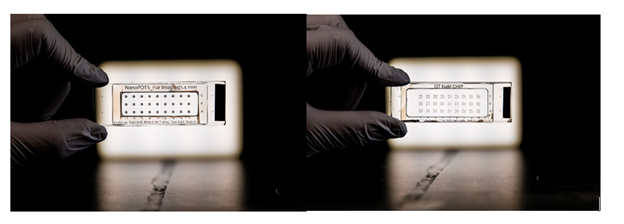Functional and Systems Biology
New nanoPOTS chip processes 10 times the number of cells in a day
Technology streamlines proteomics workflow by processing 10 times the number of cells in a day

Researchers at Department of Energy’s scientific user facility, the Environmental Molecular Sciences Laboratory (EMSL), have developed a new nested nanoPOTS chip that speeds up single-cell studies for human disease and plant science.
The N2 chip analyzes 10 times the number of cells in one day, efficiently improving the proteomics workflow. N2 also reduces sample processing volumes, allowing five times more nanowells in one microchip for high-throughput single-cell preparation.
The new design was reported Oct. 29 by EMSL analytical chemist Ying Zhu and his colleagues in a Nature Communications article. The article is also featured in a Nature Editors’ Highlights webpage.
“The N2 chip is a major step forward to enable us to routinely analyze a large number of single cells,” Zhu said.
Original versus N2
Zhu and his colleagues developed the nanodroplet Processing in One pot for Trace Samples (nanoPOTS) platform in 2018 to analyze hundreds of proteins in individual cells at the same time. NanoPOTS is a microfluidic sample preparation platform consisting of microfabricated nanowell array chips and a robotic liquid handling system. The platform is designed for proteomics profiling of mass-limited biological samples, using ultrasensitive liquid chromatography mass spectrometry to measure the global protein expression.
The original nanoPOTS chip arranged samples by individual nanowells in a grid. This chip reduced sample loss by more than 99 percent compared to other available technologies.
With internal funding from EMSL and Pacific Northwest National Laboratory, researchers improved upon the original chip used in nanoPOTS.

Previously, for multiplex single-cell proteomics workflows, researchers had to pool the chemically labeled single cells together for mass spectrometry analysis. The pooling process, which requires nanoliter-scale aspiration and transferring, is extremely challenging and tedious.
“The nested nanowell design elegantly addressed this challenge,” Zhu said.
The N2 chip has 243 nanowells, which are groups of nine nanowells nested in each of 27 clusters across the chip.
Unlike the original chip used in the nanoPOTS technology, the new N2 chip analyzes 10 times the number of cells in one day. This advancement is designed to improve proteome coverages and could aid in the identification of rare cells in clinical samples and in tracking how individual cells differ in a tumor.
“We believe that the N2 chip-based single-cell proteomics platform presented herein will enable the scientific community to study cell differentiation, tumor heterogeneity, and to identify rare cell populations from clinical specimens,” the authors wrote in the Nature Communications article. “Together with other technical developments, the N2 chip-based proteomics platform could be extended to other functional proteomics measurements such as protein post-translational modifications, protein-protein interactions, and cell-specific proteoforms.”
With the N2 chip, Zhu and his colleagues analyzed about 100 individual mouse cells derived from the lung, immune system, and axillary lymph node vessel. They quantified about 1,500 proteins in each single cell and used this information to classify cells based on protein abundance.
“One exciting application of our technology is to understand the complexity of tumor microenvironments. Single-cell proteomics would provide rich information to improve cancer diagnosis and treatment,” Zhu said.
The research team plans to develop higher-capacity N2 chips with more than 1,000 cells per chip.

